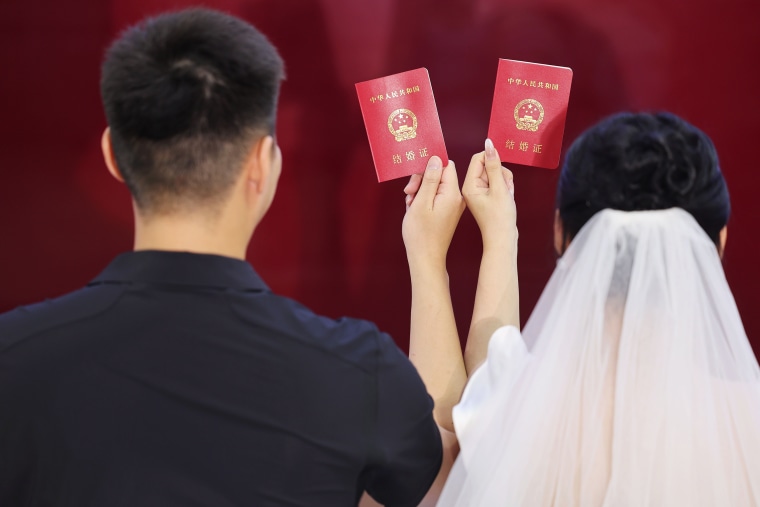HONG KONG — China might be about to make it easier to get married and harder to get divorced, the latest step in its bid to build a “family friendly society” and boost lethargic birthrates.
Couples hoping to get married will no longer be required to register at their household locations, according to a revised draft law released Sunday by the country’s Ministry of Civil Affairs, which would also slash red tape around the marriage registration process.
Divorces, however, would have a 30-day “cooling-off period” for either party to terminate the process if they’re unwilling to go through with the divorce, as officials hoped to discourage hasty separations. The change has sparked fierce criticism on social media in China, with tags related to the new law getting more than 500 million views on the social media platform Weibo.
“When they want you to do something, they’ll simplify the process, but when they don’t, there will be endless procedures and queues,” a user wrote.
“If education issues can’t be properly addressed, how can we solve marriage issues?” another said. “The biggest family expenses are education and healthcare.”

The draft law would continue the Chinese government's attempts to reverse the effects its four-decade-long single-child policy — which was aimed at arresting a massive population boom. China now faces the opposite problem: a looming demographic crisis and a shrinking and rapidly aging population.
Beijing sees marriages as part of the fix in a country where marriage certificates are necessary to register children and receive state benefits.
If nuptials are to play are key role in the government's family-planning strategy, lawmakers may have reason to worry. After a brief post-lockdown surge last year, the first half of this year had the fewest marriages for a comparable period since 2013. About 3.43 million couples were married — a drop of half a million from the same period last year, or almost 13%, according to official data.
Young people are delaying or putting off marriages altogether as they grapple with uncertainty over the future of the world’s second-largest economy, which is struggling to provide jobs.
That's despite the government's making rapid efforts to ramp up marriages and fertility rates by overhauling policies and providing financial incentives. In 2021, authorities allowed couples to have as many as three children.
Newlyweds became eligible to receive cash in some counties this year if they marry early, and authorities are also offering new parents subsidies for child care, education and fertility.
The ministry said it is inviting public comments until Sept. 11 on the draft law, which would update the two-decade-old marriage registration law, simplify divorce documentation — just identification documents and the marriage certificate would be required — and include the 30-day period, which was first implemented in 2021.
China began issuing its first four-year university degree program in all things matrimony this year, with a curriculum including wedding planning, matchmaking services and marriage counseling.

